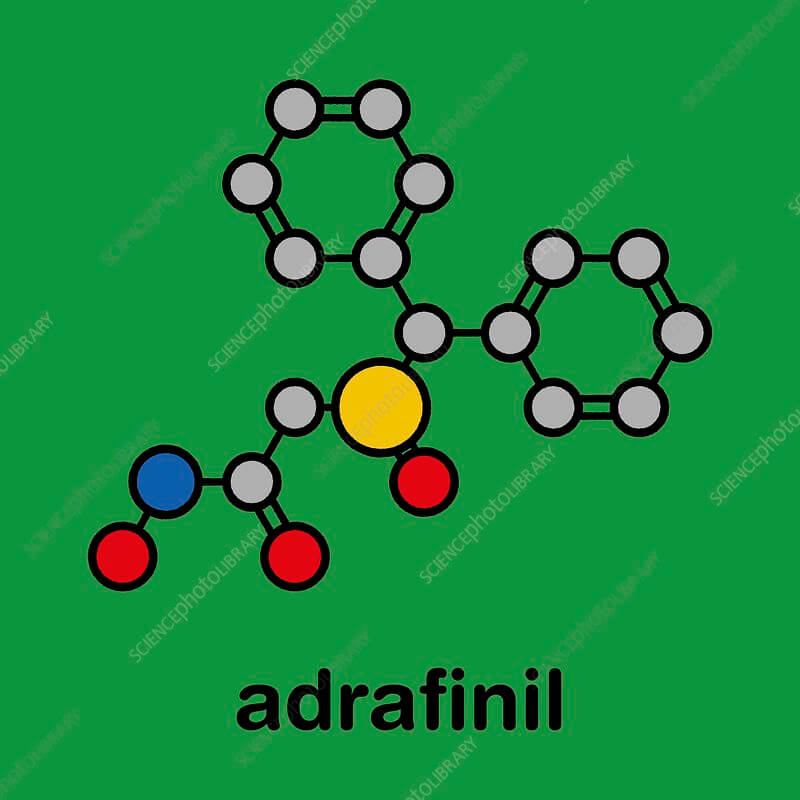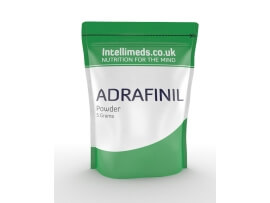Adrafinil and caffeine are popular substances known for their cognitive-enhancing effects, but they have distinct safety profiles. Adrafinil is a wakefulness-promoting agent metabolized in the body to modafinil, affecting neurotransmitters like dopamine, norepinephrine, and histamine. It can cause liver strain, dependence, and side effects like headaches, nausea, irritability, and insomnia. It is not approved by the FDA for medical use in the United States and is often sold as a research chemical or dietary supplement.
Caffeine, a central nervous system stimulant, is known for its ability to increase alertness, improve mood, and enhance cognitive function. It can cause moderation, dependence, and interaction with other substances. Combining adrafinil and caffeine may increase the risk of side effects and strain on the liver. Individuals with underlying health conditions should exercise caution when using these substances together. Consultation with a healthcare professional is recommended for safe usage.
Contents
- 1 What is Adrafinil?
- 2 How Does Adrafinil Work?
- 3 Is Adrafinil Considered a Nootropic?
- 4 What is Caffeine?
- 5 How Does Caffeine Work?
- 6 The Science Behind Caffeine’s Cognitive Effects
- 7 Potential Benefits of Combining Adrafinil and Caffeine
- 8 Safety Considerations of Combining Adrafinil and Caffeine
- 9 Legal Status of Adrafinil: A Patchwork of Regulations
- 10 Alternatives to Adrafinil and Caffeine for Cognitive Enhancement
- 11 Conclusion
- 12 FAQs: Adrafinil and Caffeine for Cognitive Enhancement
What is Adrafinil?
Adrafinil is a drug that falls under the category of eugeroics, meaning it promotes wakefulness and alertness. Developed in France in the 1970s, it was initially prescribed to treat excessive sleepiness associated with narcolepsy, a neurological disorder characterized by uncontrollable sleep episodes.
Adrafinil isn’t technically the active ingredient itself. It’s a prodrug, a substance that the body converts into another active compound. In this case, adrafinil gets broken down in the liver to modafinil, the true powerhouse behind its effects. Modafinil is a medication approved by the US Food and Drug Administration (FDA) for treating narcolepsy, shift-work sleep disorder, and excessive daytime sleepiness associated with obstructive sleep apnea.
However, adrafinil itself remains unregulated in the US, existing in a legal grey area. We’ll explore this further in a later section.
How Does Adrafinil Work?
The exact mechanism of action for adrafinil (or its converted form, modafinil) isn’t fully understood. However, researchers believe it influences various neurotransmitters in the brain, chemical messengers that play a crucial role in alertness, focus, and cognitive function.

Here’s a breakdown of some potential pathways:
- Dopamine: Dopamine is a neurotransmitter associated with motivation, reward, and pleasure. Studies suggest modafinil might increase dopamine levels, leading to enhanced focus and drive.
- Histamine: Histamine is another neurotransmitter involved in wakefulness and alertness. Adrafinil may elevate histamine levels, contributing to feelings of being energized and mentally sharp.
- Glutamate: Glutamate is the brain’s major excitatory neurotransmitter, crucial for learning and memory. Modafinil’s influence on the glutamate system might explain some of its potential cognitive benefits.
It’s important to remember that these are just some of the hypothesized mechanisms. More research is needed to fully understand the complex ways adrafinil interacts with the brain.
Is Adrafinil Considered a Nootropic?
The term “nootropic” is often used loosely to describe substances that promote cognitive function. While adrafinil might indirectly enhance certain cognitive aspects like focus and alertness through its wakefulness-promoting effects, it doesn’t necessarily fit the mold of a classic nootropic.
True nootropics are typically thought to directly target brain functions like memory, learning, and information processing. Adrafinil’s primary action seems to be keeping you awake and alert, which can indirectly create an environment conducive to better cognitive performance.

That being said, some users report experiencing improved memory, learning, and overall cognitive function while taking adrafinil. However, more robust scientific studies are needed to validate these claims.
What is Caffeine?
Caffeine is a central nervous system (CNS) stimulant and the world’s most widely consumed psychoactive drug. Found naturally in coffee beans, tea leaves, cocoa beans, and certain fruits, it’s also added to a variety of processed foods and beverages like sodas, energy drinks, and even some over-the-counter medications.
Unlike adrafinil, caffeine is a well-understood substance. Its mechanism of action is relatively straightforward and has been extensively studied.

How Does Caffeine Work?
Caffeine’s stimulating effects primarily stem from its ability to block adenosine, a neurotransmitter that promotes feelings of sleepiness and fatigue. As adenosine levels rise throughout the day, it binds to receptors in the brain, triggering the urge to sleep.
Caffeine, structurally similar to adenosine, acts as a competitive antagonist. It binds to the same adenosine receptors but doesn’t trigger the sleep response. This effectively blocks the drowsiness signal, allowing for increased alertness and wakefulness.
Here’s a closer look at the key steps:
- Adenosine Build-up: Throughout the day, adenosine accumulates in the brain as a byproduct of energy metabolism.
- Adenosine Receptor Binding: Adenosine binds to specific receptors in the brain, signaling sleepiness.
- Caffeine Intervention: Caffeine competes with adenosine for these receptors, preventing them from activating the sleep response.
- Stimulatory Effects: By blocking adenosine, caffeine promotes wakefulness, alertness, and improved focus.
The Science Behind Caffeine’s Cognitive Effects
Caffeine’s impact on cognitive function is well-documented. Studies show it can enhance various aspects of mental performance, including:
- Alertness and Wakefulness: As discussed earlier, caffeine’s primary effect is to combat drowsiness and promote wakefulness, leading to increased alertness.
- Improved Focus and Concentration: By blocking adenosine, caffeine allows for better concentration and focus by reducing distractions and mental fatigue.
- Enhanced Memory and Learning: While the exact mechanisms aren’t fully clear, caffeine might improve memory consolidation and information processing, leading to better learning outcomes.
- Reaction Time and Psychomotor Performance: Caffeine can boost reaction time and improve motor skills, making you sharper and more responsive in tasks requiring coordination.
However, it’s important to note that these effects are dose-dependent. Moderate caffeine intake (around 40mg per serving) is generally considered safe and effective for enhancing cognitive function. Excessive doses can lead to jitters, anxiety, and even insomnia, counteracting the desired benefits.
Potential Benefits of Combining Adrafinil and Caffeine
While the research on combining adrafinil and caffeine is limited, some users report experiencing a synergistic effect, meaning the combined action may be greater than the sum of their individual effects. Here’s a breakdown of some potential benefits:
Enhanced Focus and Alertness
This is likely the most prominent benefit reported by users who combine adrafinil and caffeine. Adrafinil’s wakefulness-promoting effects, potentially through dopamine and histamine pathways, could be amplified by caffeine’s adenosine antagonism. This could lead to a heightened state of alertness, allowing for deeper focus on tasks and improved ability to filter out distractions.
Imagine trying to study for an exam while feeling drowsy. The information just doesn’t seem to stick. By combining adrafinil and caffeine, you might experience a sharper mind, allowing you to concentrate on the material for longer periods and potentially absorb information more effectively.
Improved Memory and Learning
While the evidence is not conclusive, some users report experiencing improvements in memory and learning while taking adrafinil and caffeine together. Here’s how it might work:

- Modafinil’s (adrafinil’s converted form) potential influence on the glutamate system could play a role in memory consolidation, the process of solidifying new information into long-term memory.
- Caffeine’s impact on alertness and focus could indirectly benefit learning by allowing for better information processing and reduced cognitive fatigue during studying or learning sessions.
Important Note: These are just potential benefits based on user reports and theoretical mechanisms. More robust scientific studies are needed to definitively confirm these effects and understand the long-term implications of combining adrafinil and caffeine for memory and learning.
Increased Motivation and Productivity
Feeling sluggish and lacking motivation can significantly hinder our ability to get things done. The combined effects of adrafinil and caffeine might offer a solution:
- Adrafinil’s potential influence on dopamine, a neurotransmitter associated with motivation and reward, could lead to increased drive and a desire to accomplish tasks.
- Caffeine’s ability to combat fatigue and improve alertness could further enhance productivity by allowing you to sustain focus and effort for longer periods.
Imagine tackling a long to-do list feeling energized and motivated. Combining adrafinil and caffeine could potentially create that ideal state, allowing you to power through your workload more efficiently.
Potential Cognitive Benefits for Specific Needs
Students burning the midnight oil, busy professionals juggling demanding workloads, and individuals struggling with sleep disorders often seek ways to enhance their cognitive function for specific needs.
Here’s how combining adrafinil and caffeine might be relevant:
- Studying: The potential for improved focus, memory, and alertness could be highly beneficial for students cramming for exams or needing to retain large amounts of information.
- Work Performance: Increased motivation, productivity, and sustained focus could be valuable assets for those facing demanding work schedules or tasks requiring prolonged concentration.
- Shift Work or Sleep Disorders: For individuals struggling with excessive daytime sleepiness related to shift work or sleep disorders, the wakefulness-promoting effects of adrafinil and caffeine could offer some relief.
However, it’s crucial to remember that these are potential benefits, and individual results may vary. It’s also important to consult with a healthcare professional before considering any self-treatment with adrafinil or caffeine, especially if you have any underlying health conditions.
Safety Considerations of Combining Adrafinil and Caffeine
While the potential benefits of combining adrafinil and caffeine sound appealing, there are significant safety considerations to keep in mind before taking this approach.
Side Effects and Potential Health Risks
Both adrafinil and caffeine can cause side effects, and combining them might increase the likelihood or intensity of these effects. Here’s a breakdown of some potential concerns:
- Increased Anxiety and Jitters: Both adrafinil and caffeine are stimulants, and combining them can lead to heightened anxiety, restlessness, and tremors.
- Headaches: Headaches are a common side effect of both substances, and taking them together might increase the frequency or severity.
- Sleep Issues: While adrafinil promotes wakefulness, excessive stimulation from both substances can disrupt sleep patterns and lead to insomnia.
- Digestive Issues: Nausea, stomach upset, and diarrhea are potential side effects, especially on an empty stomach.
- High Blood Pressure and Heart Palpitations: Both adrafinil and caffeine can elevate blood pressure and heart rate. This can be particularly concerning for individuals with pre-existing heart conditions.
Important Note: This is not an exhaustive list of potential side effects. It’s crucial to be aware of your individual health and consult with a healthcare professional before considering adrafinil and caffeine.
Individual Sensitivities and Interactions with Other Medications
People have varying sensitivities to stimulants like adrafinil and caffeine. What might be a moderate dose for one person could be excessive for another, leading to amplified side effects.
Here’s why individual factors matter:
- Underlying Health Conditions: Individuals with pre-existing conditions like anxiety, high blood pressure, heart problems, or liver or kidney issues should avoid adrafinil and caffeine altogether.
- Medications: Both adrafinil and caffeine can interact with certain medications, potentially affecting their effectiveness or causing adverse reactions. Always disclose all medications you’re taking to a healthcare professional before considering adrafinil or caffeine.
It’s essential to get personalized advice from a doctor to determine if combining adrafinil and caffeine is safe for you, considering your individual health and medication regimen.
Importance of Dosage and Responsible Use
Even for healthy individuals, responsible use and proper dosage are critical when considering adrafinil and caffeine.
- Start Low, Go Slow: Always begin with the lowest possible effective dose and gradually increase only if necessary. This helps minimize the risk of side effects.
- Don’t Exceed Recommended Dosages: There are no established safe and effective dosage guidelines for combining adrafinil and caffeine. However, individual recommended dosages exist for each substance separately. It’s best to avoid exceeding these recommendations when combining them.
- Hydration is Key: Dehydration can worsen side effects. Ensure adequate fluid intake when taking adrafinil and caffeine.
- Monitor Your Body: Pay close attention to how your body reacts. If you experience any concerning side effects, discontinue use immediately and consult a healthcare professional.

Remember, responsible use and consulting a doctor are paramount when considering combining adrafinil and caffeine for cognitive enhancement.
Legal Status of Adrafinil: A Patchwork of Regulations
Adrafinil’s legal status varies significantly across the globe, creating a complex situation for potential users. Here’s a breakdown of some key points:
- Unregulated in the United States: The US Food and Drug Administration (FDA) hasn’t approved adrafinil for any medical use. This means it cannot be legally sold or prescribed within the US. However, possession or personal importation for personal use might exist in a legal grey area. It’s crucial to consult with a lawyer to understand the specifics in your location.
- Prescription Medication in Some Countries: In certain countries, including France (where it was originally developed), Italy, and India, adrafinil is a prescription medication used to treat excessive sleepiness associated with narcolepsy.
- Readily Available Online (Buyer Beware): Due to the lack of regulation in some countries, adrafinil is readily available for purchase online from various vendors. However, the quality and purity of these products can be highly variable, and there’s no guarantee of safety or effectiveness.
Important Considerations:
- Legal Ramifications: The legal consequences of importing or possessing adrafinil can vary depending on your location. Researching your local laws is crucial to avoid any legal trouble.
- Quality Control Concerns: Online vendors selling adrafinil might not adhere to strict quality control standards. This raises concerns about potential contaminants or unknown ingredients.
- Unforeseen Health Risks: Since adrafinil isn’t regulated in the US, there’s limited research on its long-term safety profile, especially when combined with caffeine.
Before considering adrafinil, it’s essential to weigh the potential benefits against the legal and health risks. Consulting with a healthcare professional is vital to understand if adrafinil is a safe option for you.
Alternatives to Adrafinil and Caffeine for Cognitive Enhancement
Given the potential drawbacks and legal uncertainties surrounding adrafinil and caffeine, exploring safer and more established alternatives might be a wiser choice. Here are some options to consider:

Natural Nootropics
Natural nootropics are substances derived from natural sources like plants, herbs, and foods that claim to enhance cognitive function. While the evidence for their effectiveness varies, some options show promise and are generally considered safe for most healthy individuals. Here are a few examples:
- Lion’s Mane Mushroom: This adaptogenic mushroom might support cognitive function by promoting nerve growth factor (NGF) production, a protein crucial for brain cell health and communication.
- Bacopa Monnieri: This Ayurvedic herb has been traditionally used to enhance memory and learning. Studies suggest it might improve cognitive function in healthy adults and those with mild cognitive decline.
- Omega-3 Fatty Acids: Found in fatty fish and certain nuts and seeds, omega-3s are essential for brain health. Research suggests they might play a role in memory, learning, and reducing cognitive decline associated with aging.
- L-Theanine: An amino acid found in green tea, L-theanine promotes relaxation and focus without drowsiness. Studies suggest it might work synergistically with caffeine to enhance cognitive performance without the jitters.
Important Note: Natural nootropics generally have a milder effect compared to prescription stimulants. They might require consistent use over time to experience noticeable benefits. Consulting a healthcare professional can help determine if natural nootropics are a suitable option for your cognitive enhancement goals.
Prescription Stimulants (Under Medical Supervision)
For individuals with diagnosed conditions like ADHD (attention deficit hyperactivity disorder) or narcolepsy, prescription stimulants can be a safe and effective way to improve cognitive function. Here are some commonly prescribed options:
- Methylphenidate (Ritalin): This stimulant medication is a mainstay treatment for ADHD in children and adults. It works by increasing dopamine and norepinephrine levels in the brain, promoting focus, concentration, and reducing impulsivity.
- Amphetamines (Adderall): Similar to methylphenidate, amphetamines work by enhancing dopamine and norepinephrine activity in the brain. They are prescribed for ADHD and narcolepsy to improve focus, alertness, and reduce sleepiness.
- Modafinil (Provigil): This medication, the active metabolite of adrafinil, is FDA-approved for treating narcolepsy and excessive daytime sleepiness associated with obstructive sleep apnea. Modafinil can improve alertness and wakefulness, but it’s not typically prescribed for cognitive enhancement in healthy individuals.
Important Considerations:
- Prescription Required: Obtaining prescription stimulants requires a diagnosis from a healthcare professional and ongoing medical monitoring.
- Potential Side Effects: Like all medications, prescription stimulants can cause side effects like anxiety, insomnia, and decreased appetite. A doctor can help manage these effects and determine if these medications are suitable for you.
- Not a Magic Bullet: Prescription stimulants are a tool to manage ADHD or narcolepsy symptoms. They don’t necessarily enhance cognitive function in healthy individuals, and responsible use under medical supervision is crucial.
Remember, consulting with a healthcare professional is vital before considering any prescription options for cognitive enhancement. They can assess your individual needs and recommend the safest and most effective approach based on your health history and any underlying conditions.
Conclusion
The quest for enhanced cognitive function is a constant pursuit, especially in our fast-paced world. We juggle demanding schedules, information overload, and the pressure to perform at our peak. The idea of combining adrafinil and caffeine for a cognitive boost might sound like a tempting shortcut to achieving laser focus, improved memory, and heightened productivity.
However, it’s important to approach this strategy with caution. The potential benefits of combining adrafinil and caffeine are not definitively proven by robust scientific studies. Furthermore, the legal status of adrafinil in many countries is murky, and there can be significant health risks associated with its use, especially when combined with caffeine. These risks include increased anxiety, jitters, sleep disturbances, and potential interactions with other medications.
Before embarking on any cognitive enhancement journey, prioritize safety and responsible choices. Explore natural nootropics, consult with a doctor about your goals, and consider if lifestyle changes like adequate sleep, healthy diet, and regular exercise could be more sustainable solutions.
Remember, a healthy brain is a powerful brain. Focus on creating a foundation for optimal cognitive function through healthy habits, and if you’re considering any supplements or medications, prioritize evidence-based approaches under the guidance of a healthcare professional.
FAQs: Adrafinil and Caffeine for Cognitive Enhancement
Here are some frequently asked questions about combining adrafinil and caffeine for cognitive enhancement:
1. Isn’t adrafinil basically just a weaker version of modafinil?
Adrafinil itself isn’t actually active in the body. It’s a prodrug that gets converted into modafinil by the liver. However, the conversion process takes time, and the effects of adrafinil are generally considered milder and less predictable compared to directly taking modafinil.
2. If adrafinil is unregulated, can’t I just buy it online and try it myself?
While adrafinil is available for purchase online from some vendors, there are significant risks to consider. The quality and purity of these products can vary greatly, and there’s no guarantee of safety or effectiveness. Additionally, the legal implications of importing or possessing adrafinil can differ depending on your location. Consulting with a lawyer is crucial to understand the legalities in your area.
3. Are there any natural alternatives to adrafinil and caffeine for cognitive enhancement?
Yes, several natural nootropics like lion’s mane mushroom, bacopa monnieri, omega-3 fatty acids, and L-theanine show promise for enhancing cognitive function. These options are generally considered safe for most healthy individuals, but the effects might be milder compared to prescription stimulants. Consulting with a healthcare professional can help determine if natural nootropics are a suitable option for you.
4. If I have trouble focusing and suspect I might have ADHD, could adrafinil and caffeine help?
Self-medicating with adrafinil and caffeine is not recommended for ADHD. These substances haven’t been rigorously studied for this purpose, and they could potentially worsen symptoms or interact with other medications. If you suspect you have ADHD, it’s crucial to seek a diagnosis from a healthcare professional. They can recommend the safest and most effective treatment options, which might include prescription stimulants like methylphenidate or amphetamines.
5. What are the safest and most effective ways to enhance my cognitive function?
Focus on prioritizing healthy lifestyle habits that support brain health. This includes getting enough quality sleep, maintaining a balanced diet rich in brain-boosting nutrients like omega-3s, and engaging in regular physical exercise. These strategies can significantly improve focus, memory, and cognitive performance over time. Additionally, consider exploring evidence-based natural nootropics or discuss potential benefits and risks of prescription stimulants with a healthcare professional to determine the safest and most suitable approach for your individual needs.

